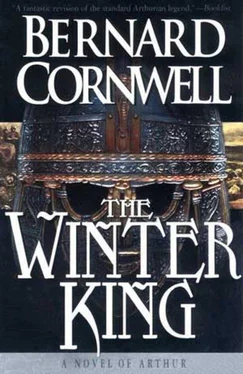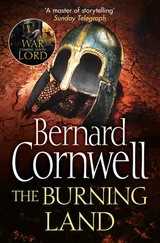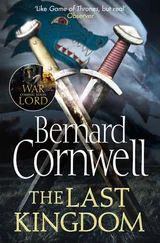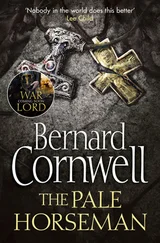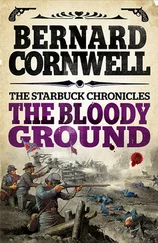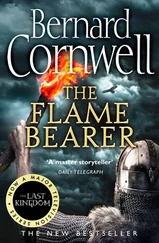The last part of the slope was the steepest, but from the brow of that final descent we could at last see the whole bed of the vale. The river ran like a black shadow on the far side, while beneath us the Roman road passed between a group of thatched huts where the enemy had to be sheltering. I could only see four men. Two were crouching near the fires, a third was sitting under the eaves of a hut while the fourth paced up and down behind the tree fence. The eastern sky was paling towards the bright flare of dawn and it was time to release my wolf-tailed spearmen to the slaughter. “The Gods be your shield-wall,” I told them, 'and kill well."
We hurled ourselves down the last yards of that steep slope. Some men slid down on their backsides rather than try to stay on their feet, some ran headlong and I, because I was their leader, ran with them. Fear gave us wings and made us scream our challenge. We were the wolves of Benoic come to the border hills of Powys to offer death, and suddenly, as ever in battle, the elation took over. The soaring joy flared inside our souls as all restraint and thought and decency were obliterated to leave only the feral glare of combat. I leaped down the last few feet, stumbled among raspberry bushes, kicked over an empty pail, then saw the first startled man emerge from a nearby hut. He was in trousers and jerkin, carrying a spear and blinking at the rainy dawn, and thus he died as I speared him through the belly. I was howling the wolf-howl, daring my enemies to come and be killed. My spear stuck in the dying man's guts. I left it there and drew Hywelbane. Another man peered from the hut to see what happened and I lunged at his eyes, throwing him back. My men streamed past me, howling and whooping. The sentries were fleeing. One ran to the river, hesitated, turned back and died under two spear thrusts. One of my men seized a brand from the fire and tossed it on to the wet thatch. More firebrands followed until at last the huts caught fire to drive their inhabitants out to where my spearmen waited. A woman screamed as burning thatch fell on her. Nimue had taken a sword from a dead enemy and was plunging it into the neck of a fallen man. She was keening a weird, high sound that gave the chill dawn a new terror.
Cavan bellowed at men to start hauling the tree fence aside. I left the few enemy that still lived to the mercies of my men and went to help him. The fence was a barricade made from two dozen felled pines, and each tree needed a score of men to pull aside. We had made a gap forty feet wide where the road pierced the barricade, then Issa called a warning to me.
The men we had slaughtered had not been the whole guard force in the valley, but rather the picquet line who guarded the fence, and now the main garrison, woken by the commotion, was showing in the shadowy northern part of the valley.
“Shield-wall!” I called, 'shield-wall!"
We formed the line just north of the burning cottages. Two of my men had broken their ankles coming down the steep slope and a third had been killed in the first moments of the fight, but the rest of us shuffled into line and touched our shield edges together to make certain the wall was tight. I had retrieved my own spear so now I sheathed Hywelbane and pushed my spear-point out to join the other steel points that bristled five feet ahead of the shield-wall. I ordered a half-dozen men to stay behind with Nimue in case any of the enemy still lay hidden among the shadows, then we had to wait while Cavan replaced his shield. The straps of his own had broken so he picked up a Powysian shield and swiftly cut away the leather cover with its eagle symbol, then took his place at the right-hand end of the wall, the most vulnerable place because the right-hand man in a line must hold his shield to protect the man to his left and thus expose his own right side to enemy thrusts. “Ready, Lord!” he called to me.
"Forward!1 I shouted. It was better to advance, I thought, than let the enemy form and attack us. The vale's sides grew higher and steeper as we marched north. The slope on our right, beyond the river, was a thick tangle of trees, while to our left the hill was grassy at first, but then turned to scrub. The valley narrowed as we advanced, though it never narrowed sufficiently to be called a gorge. There was room for a war-band to manoeuvre in Lugg Vale, though the marshy river bank did help to constrict the dry level ground needed for battle. The first clouded light was illuminating the western hills, but that light had yet to flood into the valley's depths where the rain had at last stopped, though the wind gusted cold and damp to flicker the flames of the campfires that burned in the upper vale. Those campfires revealed a thatched village around a Roman building. The shadows of hurrying men flickered in front of the fires, a horse whinnied, then suddenly, as at last the dawn's ghostly light sifted down to the road, I saw a shield-wall forming.
I could also see that the shield-wall held at least a hundred men, and more were hurrying into its ranks.
“Hold!” I called to my men, then stared into the bad light and guessed that nearer two hundred men were forming the enemy wall. The grey light glinted from their spearheads. This was the elite guard Gorfyddyd had set to hold the vale.
The vale was certainly too broad for my fifty men to hold. The road ran close to the western slope and left a wide meadow to our right where the enemy could easily outflank us and so I ordered my men back.
“Slowly back!” I called, 'slow and sure! Back to the fence!“ We could guard the gap we had ripped in the tree fence, though even so it would only be a matter of moments before the enemy clambered over the remaining trees and so surrounded us. ”Slowly back!" I called again, then stood still as my men retreated. I waited because a single horseman had ridden out from the enemy ranks and was spurring towards us.
The enemy's emissary was a tall man who rode well. He had an iron helmet crested with swan feathers, a lance and sword, but no shield. He wore a breastplate and his saddle was a sheepskin. He was a striking-looking man, dark-eyed and black-bearded, and there was something familiar in his face, but it was not till he had reined in above me that I recognized him. It was Valerin, the chieftain to whom Guinevere had been betrothed when she had first met Arthur. He stared down at me, then slowly raised his spearhead until it was pointed at my throat. “I had hoped,” he said, 'that you would be Arthur."
“My Lord sends you his greetings, Lord Valerin,” I said.
Valerin spat towards my shield that again carried the symbol of Arthur's bear. “Return my greetings to him,” he said, 'and to the whore he married.“ He paused, raising the spear-point so that it was close to my eyes. ”You're a long way from home, little boy,“ he said, 'does your mother know you're out of bed?”
“My mother,” I answered, 'is readying a cauldron for your bones, Lord Valerin. We have need of glue, and the bones of sheep, we hear, make the best."
He seemed pleased that I knew him, mistaking my recognition for fame and not realizing that I had been one of the guards who had come to Caer Sws with Arthur so many years before. He raised his spear-point clear of my face and stared at my men. “Not many of you,” he said, 'but many of us. Would you like to surrender now?"
“There are many of you,” I said, 'but my men are starved for battle, so will welcome a large helping of enemies." A leader was expected to be good at these ritual insults before battle and I always rather enjoyed them. Arthur was never good at such exchanges, for even at the last moment before the killing began he was still trying to make his enemies like him.
Valerin half turned his horse. “Your name?” he asked before riding away.
Читать дальше
